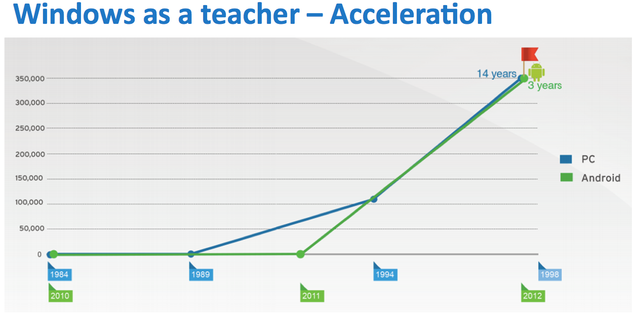
Your smartphone may be as powerful as a computer, but it's also hobbled. You can only install apps on it from the walled garden of the official app store. Your options are limited to the small, vetted collection of "approved" apps as opposed to the unlimited options available for PCs. That's where jailbreaking comes in.
Let's face it — your phone wants to limit your freedom. iOS limits third-party applications, and Android disables them by default. But you can remove these restrictions by using a few creative hacks to root your Android phone, or jailbreak your iDevice. Now you're free to explore a wide-open (but sometimes dangerous) world of fantastic apps that Apple, Android and their network providers don't allow. And that's still true.
But as mobile operating systems grow up, the risks are eclipsing the benefits for the average user. As mobile OSes become more usable, full of all the features you want, jailbreaking has become something that's largely helpful for power users and developers. Most consumers no longer need to jailbreak their phones just to have a decent experience.
Smartphones have never been a bigger target for malware
In fact, when typical users jailbreak their phones, they may be opening themselves up to problems they can't handle. According to security firm Sophos, the explosion in smartphone malware followed the same pattern as the explosion of PC malware, but sped the hell up. Smartphones reached higher levels of malware infection in 18 months than PCs achieved in 15 years.
The varieties of phone malware include SMS trojans that text at premium rates without your knowledge, or iOS-centric malware that sniffs for your Apple ID and passwords, and Android apps that use root access to install malicious code. When you leave the walled garden of apps that Google or Apple put in place to prevent malware, you could be opening yourself up to more dangers (admittedly, malware has appeared in app stores too).

Android Malware samples by year compared to PC (via SophosLabs)
"Pretty much anything you can think of, people are trying to find ways to break into those systems and find vulnerabilities," says Satnam Narang, a security response manager with Symantec. "It's definitely growing over the years...as the platforms mature and as the developers of these malicious apps are getting smarter, there's definitely a lot of opportunity. And where there's opportunity, that's where the bad guys are going to go."
A sprawling report on digital security touches on a few reasons why mobile malware continues its steady incline. Third-party app stores mimic the familiar click-and-install process of iTunes or Google Play, but with significantly less oversight on what those apps actually do. Malware developers hide their malicious code inside innocuous apps — once you install these bad apps, adversaries have complete access to everything. If your phone is unrooted, you are less likely to be exposed to random malware dangers from crappy apps.
"On iPhone, now that you've removed that protective wrapper, the innards are exposed where just about anything can be done with the device remotely," Wisniewski told us. "The legitimate apps don't change at all...but everything else you've loaded on the device ultimately has the privilege to do anything. It doesn't ask permission anymore. You've left yourself completely naked."
Rooting an Android device opens up the same Pandora's box, but it's an even more wide-spread practice. In places like Russia and China, where an official Google presence is sparse, the markets are full of pre-rooted devices, customized to come loaded with sketchy, third-party stores. It's a hotbed for Android malware experimentation, and the results spill over to rooted devices across the globe. Criminals always follow the dollar signs, Wisniewski says, and that trail leads them right to rooted Android devices.
To help tackle some of these admitted software issues, Google works with security firms and developers to make antivirus apps, and there are some good ones, too (see: CM Security). But those only go so far, Wisniewski says. An antivirus app won't protect you from everything.
Mobile OSes are more customizable and powerful than ever
There is also the question of whether typical users really need to root or jailbreak smartphones anymore. Pre-iOS 8, iPhone users couldn't use third-party keyboards without cracking open the operating system. And in earlier days, you'd have to jailbreak for even simpler pleasures like a quick settings menu, or folders. But by now, iOS has grown up to accommodate most if not all of these desires, and as it does, the reasons to jailbreak become ever more niche and specific.
On Android, the heinous skins—one of the main things hackers would tinker to get around—have become less egregious than ever. LG's version of Android got cleaned up big time after the horrible software on the G2. Samsung toned down its TouchWiz skin on the S5, with rumors it'll go even further on the S6. Meanwhile Motorola is putting out phones that are basically stock Android, with a few additional apps that actually add value. Yes, there are extra carrier apps that are annoying and undeletable unless you go through the trouble of rooting your phone and opening it up to all the dangers of the world. But it's less of a no-brainer than it's ever been.
Jailbreaking is dead — long live jailbreaking
Still, the option to jailbreak and root your phone is one that should always survive. Its dangers may be growing and its perks for everyday users shrinking with each passing OS update, but cracking open your device and tinkering around is the digital frontier for smartphones. Jailbreak developers continue create new ways to push the device even further and those feature could very well become standard for millions of iOS 9, 10 users and beyond. It's glimpsing into the software future in many ways, and that's why it's so a m a z i n g.
Unlocking the true potential of a phone used to be a no-brainer for everyone. But that knee-jerk reaction that as soon as you pop a smartphone out of the box you must immediately root or jailbreak it is becoming a thing of the past. Whether it's because malware is becoming more complex, or Google, Apple, and smartphone makers finally getting their shit together (somewhat), rooting and jailbreaking is now reserved for the smartphone savvy. It's not a means to "fix" missing features on a phone.
It's ultimately up to you if rooting is your thing (and maybe it is), but if you are going to walk the jailbroken path, it's best to know what you're getting into—for better or worse.
from ffffff http://gizmodo.com/the-golden-age-of-jailbreaking-is-over-1687815496
via IFTTT







0 comentarios:
Publicar un comentario